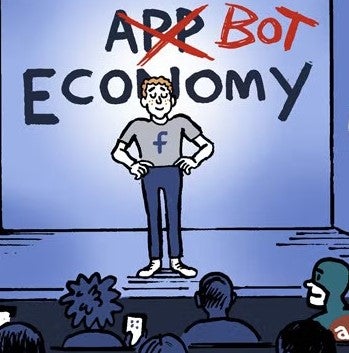A Mastercard Up Their Sleeve
With Amazon’s rocketing ad revenue growth, it’s only a matter of time before all payment and transaction data owners want in on the fun.
PayPal launched its media business a year ago, hiring Mark Grether, former leader of Amazon Ads. There was also news this week of ChatGPT syncing up with payment processor Stripe – a deal that Eric Seufert of Mobile Dev Memo described as “an advertising data feed.”
Now it’s Mastercard’s turn, Adweek reports. The company just launched Mastercard Commerce Media, an ad network spanning its properties and publishing partners based on some 500 million enrolled cardholders.
Mastercard’s publisher network isn’t exactly the web, à la Google’s or Meta’s respective audience networks. Its inventory partners feature the likes of airlines, banks and retailers that already have strategic partnerships with Mastercard as well as their own retail media-ish businesses.
It’s worth noting that Mastercard doesn’t have interesting inventory of its own. But there’s a strong selling point for its data. One of the main hangups for retail media is that retailers possess great data but only for their own business. Credit card companies and general purchase processors can see across stores, sites and apps – basically, wherever transactions happen.
Ad-ificial Intelligence
Water is wet, the Pope is from Chicago, and Meta is planning to sell targeted ads based on people’s prompts and interactions with its AI chatbot products.
The change is not immediate. TechCrunch reports that Meta plans to update its privacy policy by December 16 and begin notifying users “in the coming days.” The policy updates also won’t apply to users in certain markets based on national privacy laws, such as in South Korea, the UK and across the EU bloc.
However, the update will affect AI product offerings beyond just Meta AI, according to what company spokesperson Emil Vazquez tells TechCrunch. For instance, Meta is explicitly leaving open the possibility of targeting ads to users based on audio, images and video collected via Meta’s Ray-Ban smart glasses.
What’s off the table, though, according to Christy Harris, a Meta privacy policy manager, is targeting ads based on “sensitive topics” like religion, health and politics. Yet it was only four months ago that many Meta AI users were shocked to learn that the app publicized their prompt histories on a “Discover” feed.
Meta’s spokesperson also confirms that there’s no way to opt out of sharing data with the company’s AI products.
Post Mortem
The Washington Post’s subscription business has flatlined – actually, downlined would be more accurate – since owner Jeff Bezos started taking a heavier hand in its editorial direction several years ago.
In 2023, Bezos hired a new publisher, Will Lewis, who pivoted WaPo’s coverage in a more conservative direction and offered buyouts. A near exodus of prominent writers prompted a fresh wave of subscription cancellations.
And after Bezos spiked WaPo’s endorsement of former VP Kamala Harris, the company lost 250,000 digital subscribers – 10% of its total.
Print is an even bigger disaster, with WaPo’s daily circulation now at 97,000 newspapers per day on average, according to the Alliance for Audited Media. That’s fewer than in 1970.
These trends all put pressure on digital advertising – and now WaPo Ad Chief Johanna Mayer-Jones, who joined in 2023, is plotting her exit, reports Oliver Darcy at Status.
Mayer-Jones has kept the ad dollars flowing despite the newspaper’s drops in circulation, Darcy writes. But, while WaPo denies plans for her departure, Darcy claims Mayer-Jones has explored other roles and was recently a finalist for CNN’s top ad sales position.
If Mayer-Jones departs, Darcy adds, “it would deal a significant blow to The Post at precisely the wrong moment.”
But Wait! There’s More!
Zeta acquires Marigold’s enterprise software business for $325 million. [Business Insider]
People, Inc. acquires food publisher and creator network Feedfeed for an undisclosed price. [Axios]
Google is blocking AI search results for “Trump” and “dementia.” [The Verge]
NPR marked Wednesday as the “first day in [US] public media’s history without federal funding.” [Instagram]
A stray bullet knocked tens of thousands of people in Texas offline after hitting one of Spectrum’s fiber optic cables outside Dallas. [404 Media]
Here’s today’s AdExchanger.com news round-up… Want it by email? Sign up here.
















